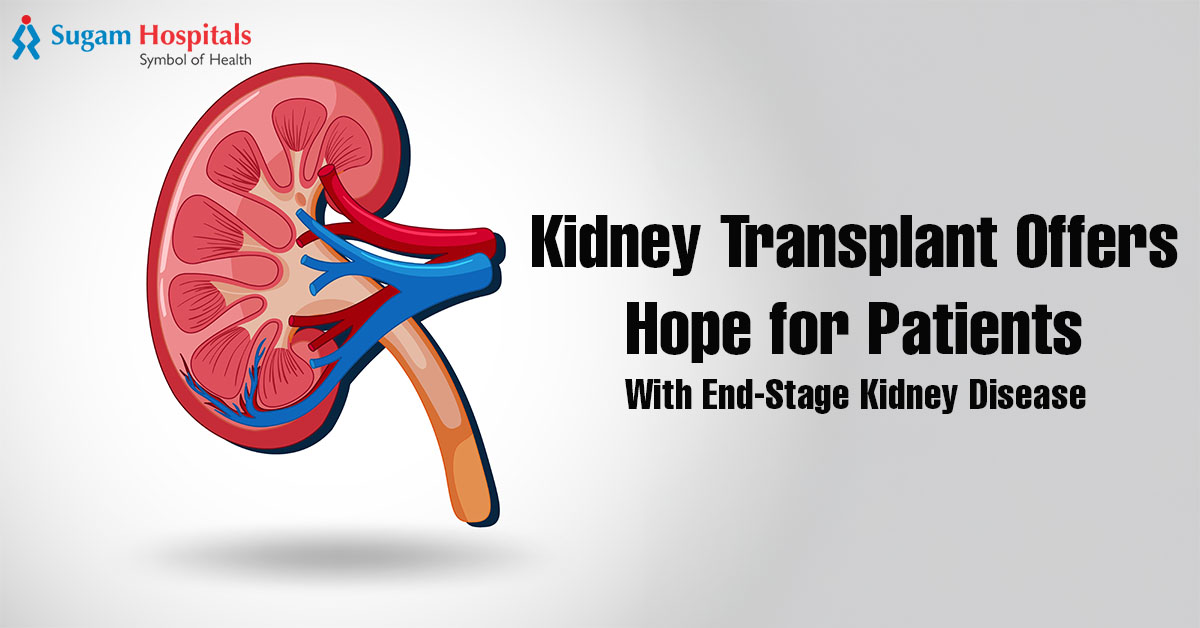Kidney Transplant Offers Hope for Patients with End-Stage Kidney Disease

Kidney Transplant Offers Hope for Patients with End-Stage Kidney Disease
November 21, 2025 by adminLife for those suffering from end-stage kidney disease (ESKD) may turn into a never-ending fight against exhaustion, fluid retention and dialysis sessions that weigh heavily. When the kidneys lose the ability to filter waste properly, a kidney transplant is usually the most viable way to get back to good health and freedom. The operation is more than just surgery, it’s basically the opportunity for a new life.
Understanding End-Stage Kidney Disease
Kidneys are organs that help in removing waste from the body, keeping the electrolytes balanced and also regulating the fluid levels. If their ability to carry out these tasks is less than 15%, it is referred to as end-stage kidney disease.
The only choices available for treatment are dialysis or kidney transplantation.
In a way, dialysis keeps the patient alive by doing some of the tasks that the kidneys usually do, however, it is not able to take over all the functions of the kidneys nor provide the same standard of living. A transplant, therefore, is a source of renewed optimism.
Why Kidney Transplant Is a Better Option
What a kidney transplant actually does is to change the organ that is causing the failure in the body with a healthy one. This healthy kidney can either be from a living or a deceased donor. As opposed to dialysis, which is just a temporary filtering of the blood, transplant is a full restoration of kidney function and makes it possible for the patients to lead more normal and active lives.
The main benefits are:
- Freedom from dialysis: No more weekly sessions or restrictions that are dependent on the dialysis schedules.
- Improved energy and vitality: The patients get back their stamina, appetite and also their mental clarity.
- Increased life expectancy: Transplant recipients are shown in studies to often live longer than those who are on dialysis for a long time.
- Quality of life becomes better: When the kidney function has improved, diet, traveling and working become more manageable.
Who Can Benefit from a Kidney Transplant
It is not the case that each patient that suffers from kidney failure is directly given a kidney transplant. After referral to a nephrologist and urology specialist, the decision for transplant is made based on the patient’s general health and compatibility.
Basically, the first candidates for the transplant would be:
- Patients with chronic kidney failure that originate from diabetes, high blood pressure or polycystic kidney disease.
- Persons who are in good health and are able to take medicine after the surgery.
- Those who have a compatible donor, a living relative or a deceased donor kidney.
The Kidney Transplant Process
A kidney transplant is a complex procedure that requires several steps and detailed planning.
- Evaluation: Tests are performed by the doctors to check the function of the heart, liver and the immune system so as to confirm the patient’s suitability for the operation.
- Finding a Donor:
-
- Living donors: Those are the people who are either related genetically or non-related volunteers.
- Deceased donors: Those are people who have given their consent for organ donation.
- Surgery: The new kidney is installed in the lower part of the belly. Generally, the patient’s kidneys that are damaged will not be removed.
- Recovery and Follow-Up: Patients are required to be under a very close watch condition. Especially during the first few weeks, the doctor checks for any rejection and makes medication changes.
Life After a Kidney Transplant
In order for a transplant to be successful, it necessitates care and commitment that lasts throughout the lifetime. After the surgery, patients are given immunosuppressive drugs that inhibit the immune system from attacking the new organ.
The care after the transplant consists of:
- Follow-up appointments on a regular basis.
- Eating a healthy diet that is low in sodium and processed foods.
- Drinking enough water and not consuming alcohol or smoking.
- Medications should be taken strictly according to the doctor’s instructions.
As long as the transplant recipients take good care of themselves, they can enjoy a healthy and active life for many years to come after the surgery.
The Role of Expert Medical Care
Transplanting a kidney is fairly complicated surgery which needs the expertise of a team of doctors including nephrologists, urologists and transplant surgeons. It is the expert care that ensures the operation is carried out safely, that the organs are compatible and that the patient remains healthy for a long time during all the steps from the pre-operative evaluation and follow-up throughout the patient’s lifetime.
It is very important that you get the best possible care if you or your dear one are thinking of having a transplant. Facilities with specialized urology and nephrology departments can take you through the whole process with ease from donor matching to post-operative recovery.
A kidney transplant is essentially a medical fix of the highest order, it is another chance to live life. So, with the proper medical skill and care over time, patients who have kidney failure can actually anticipate living a better, more satisfying life.
If you need kind, expert renal and transplant care, visit Sugam Hospital known as one of the best urology hospitals in Chennai. We are committed to create individualized treatment plans as well as providing ongoing care which enables patients to regain their physical strength, emotional stability and confidence in the future.

